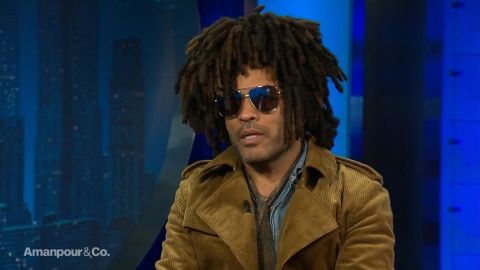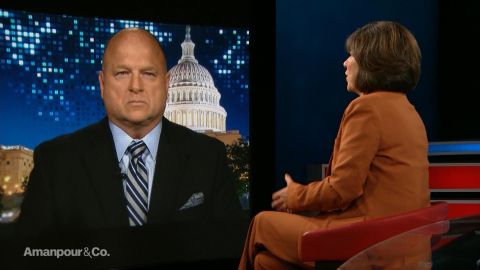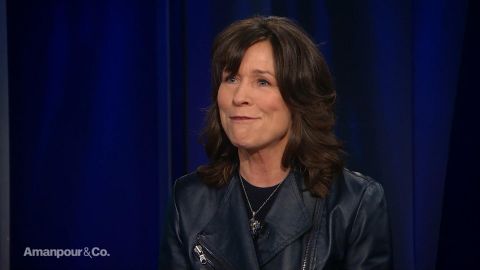Read Transcript EXPAND
AMANPOUR: Lenny Kravitz has been rocking out for three decades, releasing hit albums and starring in mega movies like The Hunger Games. Now, he’s putting out his 11th studio album which is called “Raised Vibration”. He sat down with our Hari Sreenivasan and spoke about how he slept his way through this latest album and how growing up with his Russian Jewish father and his African-American mother shaped who he has become.
HARI SREENIVASAN: Raised Vibration, new album, tell me a little bit about it.
LENNY KRAVITZ, MUSICIAN AND ACTOR: Very inspired.
SREENIVASAN: By what?
KRAVITZ: Very inspired by life. Before I started the album, I had to think who am I at this point. You go through so many different versions of yourself over the years. It’s been 30 years now. And you can be a little confused as to what do I want to say, where do I want to go, what am I feeling. So the first thing you have to do is stop. So I went to the Bahamas where I live and I got really quiet. And after several weeks because you’re in this environment, nature, quiet, so few people, you begin to come down and decompress and then the dreams begin. And all of these songs on the album were given to me through dreams. So they were direct downloads and that happens to me —
SREENIVASAN: From your own consciousness?
KRAVITZ: — a lot. Yes. But I’ve never dreamt an entire album. I may dream two or three songs on an album and the rest come just out of the air but these were actually in dreams clicking up between the hours of 3 and 5 a.m.
SREENIVASAN: So do you hear in your brain complete pieces of music?
KRAVITZ: Absolutely.
SREENIVASAN: So you’re just trying to what, get it out and saying, OK, write this down?
KRAVITZ: Well, you hear — you’re asleep. You’re in your dream. You hear it. And then you have to make yourself wake up because you’re in bed, it’s comfortable and you’re hearing it. And you think maybe I’ll remember it in the morning. But when you do that — at least for me, when I’ve done that, they are normally gone. So You have to get up. I keep a recording device next to the bed. I keep a guitar in the room. And I begin to transcribe what it is that I’m hearing in my head onto the recording and then I go into the studio. And I have that framework to work from.
SREENIVASAN: Right. So does music come first? Do the lyrics come?
KRAVITZ: It depends. Sometimes I hear the whole thing. For instance, on a song like “Here To Love”. That was a direct download. The words and the music all came. A lot of the time —
SREENIVASAN: So you got up out of bed, pressed record, and that just happened?
KRAVITZ: Yes. Yes. And it’s beautiful because you’re not in — your conscious self is not involved. And that’s when it’s the most beautiful. Where did this come from? I didn’t do this. I was given this. And that’s when it’s really beautiful. It’s really pure.
SREENIVASAN: When you work with other musicians, do you find a similar process that people are somehow getting it from somewhere beyond themselves?
KRAVITZ: When I produced Mick Jagger and we were writing together and I was watching him come up with the lyrics and it was the same way that I do it when it’s not in a dream when I’m not being given the lyric, the total lyric. But you start with this sort of scatting of words that aren’t words, sounds. And I watched him do it and I was like that’s how I do it. You just kind of start to get this dream. And when you listen back to it, even though you haven’t said one real word, you listen back and you hear the lyrics. And I watched him do it. It was the same thing we wrote this song together. And it’s very interesting. I’m sure a lot of people do it that way.
SREENIVASAN: For non-musicians, that — this seems like a totally foreign idea and process but it’s really fascinating to hear that somehow your brains are able to process and it’s totally different.
KRAVITZ: It is. You just — either you hear it or you create it from this mumble jumble thing which then turns into real thoughts and feelings from your subconscious. It’s really interesting. It’s like your subconscious speaking.
SREENIVASAN: Without words getting in the way?
KRAVITZ: Notice how people, when they talk about speaking in tongues in churches, like you’re speaking this language that doesn’t exist but God can understand it. So it’s interesting. Your subconscious is speaking this language and then you understand it.
SREENIVASAN: You also play a lot of the instruments when you’re doing it in your own recording studio.
KRAVITZ: Yes, it depends on the track. Sometimes I play all of the instruments. Sometimes —
SREENIVASAN: So was that all in your head and you’re trying to sit there and go back with, OK, this is what the drums are going to be?
KRAVITZ: Well, yes, I hear it all. So I’m able to run from one instrument to the next. So I’ll start on the drums and the guitar and the bass, and maybe more guitar, whatever keyboard I might use. And I might do percussion or an orchestrate.
SREENIVASAN: There’s a track about It’s Enough that has, for me anyway, a kind of a Marvin Gay, Curtis Mayfield sort of vibe to it.
KRAVITZ: Absolutely comes from that school.
SREENIVASAN: And what were you thinking? What was the story behind it? Was this a direct download?
KRAVITZ: Again, it was a download. But that song for me is a very easy song to write because it’s a mirror to what’s happening in this world.
SREENIVASAN: It’s much more political.
KRAVITZ: Absolutely.
SREENIVASAN: Most political on this album.
KRAVITZ: Absolutely. It’s hard not to reflect what’s going on. We’re living in really trying times, very interesting times. And it just boggles my mind that human beings are going in this direction that we are completely destroying ourselves and so much is based on greed and power and business and control. But we’re at a cross road and we’re either going to take the road to destruction and then maybe we’ll learn or we’re going to take the road to turning this around and putting all of our energy into trying to fix these problems.
SREENIVASAN: Another track on there, you have a lyric, hug me like Johnny Cash. What does that mean?
KRAVITZ: What happened, we’re going back 21 years now. My mother was fighting breast cancer. And she lost the battle. But when I got the news, I just came home from a tour of Japan. I went straight to the hospital. She was already at the stage where they had her on morphine and she was in and out of consciousness. And after being there all the day, we all decided, people in the family, let’s all go to wherever we’re staying. We’ll get some food, take a shower and come back and spend the night there. And at that time, I was living with Rick Rubin, the producer. He gave me a section of his house to live in for several years. And in the time it took me to get me from the hospital to Rick’s house, my mother passed. And so when I got to the house, I got the phone call. And Johnny Cash and June Carter were living in that same house at the same time as well because Johnny was there making an album. That acoustic record that he made, the legendary record. And when I got the news, I was at the bottom of the stairs getting ready to go upstairs to my room. And I had no idea she was going to pass that quickly. And I was shocked and obviously dealing with the finality of that. And Johnny and June were coming down the stairs. Johnny said, “Hey. How are you doing?” He just saw me walk in. And I said my mother just died. I was just standing there against the wall, couldn’t really move. The two of them came down the stairs, surrounded me and they both grabbed me and held me really tightly and were saying things that were really beautiful. They were comforting me. It was a really beautiful moment because we knew each other but we weren’t close friends. We were sharing the same home. We passed each other in the hallways. We didn’t know each other like that. And they took that moment to just be really beautiful people. So the song is not about that. But what it’s about is a break up that I had just gone through. I was singing to this person and I was saying hold me like Johnny Cash when I lost my mother, whisper in my ear like June Carter. And though I fight these tears that I hide, just hold me tight for the rest of my life. So obviously, the last time that I was comforted in such a deep way was the day my mother died when Johnny Cash held me and I was singing to this person saying I need your comfort so hold me like Johnny Cash. It was a very interesting way to get to that message.
(BEGIN VIDEO CLIP)
KRAVITZ: Just hold me like Johnny Cash when I lost my mother. Whisper in my ear just like June Carter
(END VIDEO CLIP)
SREENIVASAN: When did you know this was your calling? When did you start getting the downloads? I mean are these different points when did you know music was going to be the thing that you wanted to do?
KRAVITZ: When I was about five, I was listening to the Jackson 5 on those wonderful Motown singles. I had Stop The Love You Save, and ABC, and all of these great 45s that my mom and my grandmother bought me. And I was obsessed with the group. Not only the music but their whole look and their way of performing. And Then my father took me to Madison Square Garden when I was in first grade. I would have been six u suppose.
SREENIVASAN: That’s your first concert?
KRAVITZ: My first concert, Jackson 5 at Madison Square Garden —
SREENIVASAN: Wow.
KRAVITZ: — with the Commodores opening. I saw this show and my life changed. The next day, everything was different. I knew that’s what I wanted to do.
SREENIVASAN: Your dad was around a lot of famous musicians,
KRAVITZ: Yes. My father worked at NBC News. My parents met at 30 Rock. My mother was a secretary for an executive there and she was moonlighting. In the evening, she was doing theater and eventually she did theater full- time and then moved on to television. My father was a producer, an assignment editor. He worked with people like Peter Arnett back in the day and Liz Trotta and all these journalists and he also was very interested in jazz music. So we were always around jazz musicians and going to see everybody. I remember my fifth grade, going back a year, we went to see Duke Ellington at the Rainbow Room. And we showed up for sound check and Duke sat me on his lap and had me sit there while he played the piano. Being around people like Miles Davis and Sarah Vaughan and Myla Hampton, all these great people, Lincoln Center, going to concerts, going to the operas and ballets and Shakespeare in the park and the public theaters, seeing James Brown. New York at that time was just so vibrant with the live music.
SREENIVASAN: Your mother’s black, your father is Jewish. She goes onto play one of the first interracial couples. Did you realize what a big deal that was because you see this — ?
KRAVITZ: Well, to me (CROSSTALK) because my father was white. So it was very interesting that Norman Lear chose her. In fact, I just saw Norman Lear recently. I haven’t seen him since I was a teenager. And I walked up to him and I was just thanking him because him choosing my mother, [13:55:00] this role changed our lives. I would not be sitting here with you, I don’t think if that hadn’t happened. I learned so much and my life changed so much. I, musically, ended up doing a lot of things out there musically. But back to that question. It’s interesting that he chose this woman. He had no idea that my mother was married to a white man. And so he had her come out to Los Angeles to audition. He decided that he wanted her to play the role. He said, “Listen, I just want to talk with you before I hire you. I just really want to make sure you’re comfortable because you’re going to have to be with this man, you’re going to have to play his wife, and you’re going to have to kiss him and hug him. Are you OK with this?” And my mom went into her purse, pulled out her wallet, had a picture of my dad. She showed it to him. He said, “OK, you got the part”.
(BEGIN VIDEO CLIP)
UNIDENTIFIED FEMALE: You know who made those things up, don’t you? Rich people. To keep poor people happy about being poor. I got plenty of nothing and nothing’s plenty for me.
(END VIDEO CLIP)
SREENIVASAN: Music critics have always had a tough time figuring out and they’ve put you unto these boxes. They’ve tried to put you. The music is not black enough, it’s not white enough, it’s not rock enough. Partly because of where you came from but also that your music goes all sorts of places.
KRAVITZ: Which is what it’s all about to me. I love music. There’s no color to music. I love music and I incorporate all styles. But in the selling of music, people want to be able to have a place to put it. Where are we going to market you? You’re black. You’re supposed to fit into the R&B category or at that time, hip-hop, early hip-hop.
SREENIVASAN: Here he is with a guitar.
KRAVITZ: And I didn’t. I came in with this guitar-oriented music that leaned more on the Rock & Roll side, which of course, Rock & Roll is black music but somehow wasn’t considered that at that time. But my record label that I signed with, Virgin Records, was very honest with me and they said they believed in the music. They weren’t sure exactly how they were going to market it. Thus they sent me to Europe first where they thought there was less of these putting folks in a box and
—
SREENIVASAN: That’s where you became more successful.
KRAVITZ: That’s where I started. I went to Paris. I went to London. I went to Amsterdam. And I went to Hamburg. And that’s where it started. They accepted me as I was. And then I came back to America later toward the end of the Let Love Rule album. I did a whole tour and Tom Petty took me on tour. Bob Dylan took me on tour. David Bowie took me on tour and then I started doing my own gigs.
SREENIVASAN: There’s also a throw line of spirituality in your music. And I don’t think most people recognize that. I’m wondering when did that start, how did that start for you? When did you — how would you consider yourself? You have a Christian and a Jewish person in your household. How did your parents —
KRAVITZ: I grew up going to church. I grew up going to temple. I was not forced to go any certain direction. My grandmother was a devout Christian. And I had all of that and I had my own experiences with the teachings of Christ. It was all beautiful. It was all — it’s all still part of me. And the same thing with color. I mean my mother at a very young age sat me down and said, “Listen, I’m black. This is our history. The Bahamas, African-American. Your father is a Russian Jew. You’re no more one than the other. You have both sides. Be proud of both sides. Embrace both sides.” But she said society is only going to see you as black. That meant that people were not going to see the diversity. They weren’t going to accept all of this beauty within you. Your skin’s brown. That’s what you are.
About This Episode EXPAND
Christiane Amanpour speaks with David Urban about President Trump’s 2020 campaign; and Kori Schake about America’s global leadership in 2019. Hari Sreenivasan speaks with musician and actor Lenny Kravitz about his life and career.
LEARN MORE


